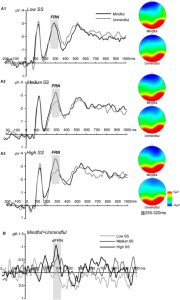Mindfulness-Based Therapies Benefits are Greatly Affected by Social Factors in Therapy
By John M. de Castro, Ph.D.
“Designed to deliberately focus a person’s attention on the present experience in a way that is non-judgmental, mindfulness-based interventions, whether offered individually or in a group setting, may offer benefit to people seeking therapy for any number of concerns.” – Manuel A. Manotas
Psychotherapy is an interpersonal transaction. Its effectiveness in treating the ills of the client is to some extent dependent upon the chemistry between the therapist and the client, termed the therapeutic alliance. Research has demonstrated that there is a positive relationship with moderate effect sizes between treatment outcomes and the depth of the therapeutic alliance.
There are also other factors that may be important for successful therapy. The client’s engagement in the process as well as the therapists interpersonal skills may also be important ingredients in producing successful therapeutic outcomes. There are also important social factors present particularly when the therapy is provided in groups. In addition, formal and informal practice effects are involved. There is little known, however, of the role of these components of therapy on the effectiveness of treatment for mental health issues such as depression.
In today’s Research News article “The Contribution of Common and Specific Therapeutic Factors to Mindfulness-Based Intervention Outcomes.” (See summary below or view the full text of the study at: https://www.ncbi.nlm.nih.gov/pmc/articles/PMC7874060/ ) Canby and colleagues recruited patients diagnosed with mild to severe depression and randomly assigned them to receive once a week for 8 weeks, 3 hour sessions of either focused meditation, open monitoring meditation or Mindfulness-Based Cognitive Therapy (MBCT) which contains both focused and open monitoring meditation practices. Before and after the 8-weeks of practice and 3 months later they were measured for empathy, therapeutic alliance, formal and informal mindfulness practices, depression, anxiety, stress, mindfulness, and group therapeutic factors in group therapy: instillation of hope, secure emotional expression, awareness of relational impact, and social learning. Finally, they received structured interviews exploring mindfulness practices and impact of treatment.
They found that the over treatment and follow-up the groups had significantly increased mindfulness and significantly decreased anxiety, depression and stress. They found that the higher the ratings of the instructors. the ratings of the groups and the amounts of formal meditation practice the greater the changes. In general, the instructor and group factors had stronger relationships to the psychological improvements than the amount of formal meditation and the amount of informal meditation practice had no relationship with the improvements. The analysis of the structured interviews indicated that the participants found the instructor and group factors including bonding, instilling hope, and expressing feelings were important to their improvements.
These results are interesting replicate previous findings of mindfulness-based therapies produce improvements in anxiety, depression, and stress. The results suggest that mindfulness-based therapies have complex effects and changes in mindfulness may be less important than the social environment produced by the instructor and the group. These social factors may account for a large proportion of the benefits to the participants. These results are important as they suggest that empathizing the social interactions involved in therapy may improve the impact of the therapy on the patients’ psychological well-being.
So, mindfulness-based therapies benefits are greatly affected by social factors in therapy.
“Mindfulness’ strength is in helping us to see more clearly, by giving us the room to not be so quickly reactive. And over time the event does not have to jump to emotional distress, like a grasshopper leaping over a stream.” – Barry Boyce
CMCS – Center for Mindfulness and Contemplative Studies
This and other Contemplative Studies posts are also available on Google+ https://plus.google.com/106784388191201299496/posts and on Twitter @MindfulResearch
Study Summary
Canby, N. K., Eichel, K., Lindahl, J., Chau, S., Cordova, J., & Britton, W. B. (2021). The Contribution of Common and Specific Therapeutic Factors to Mindfulness-Based Intervention Outcomes. Frontiers in psychology, 11, 603394. https://doi.org/10.3389/fpsyg.2020.603394
Abstract
While Mindfulness-Based Interventions (MBIs) have been shown to be effective for a range of patient populations and outcomes, a question remains as to the role of common therapeutic factors, as opposed to the specific effects of mindfulness practice, in contributing to patient improvements. This project used a mixed-method design to investigate the contribution of specific (mindfulness practice-related) and common (instructor and group related) therapeutic factors to client improvements within an MBI. Participants with mild-severe depression (N = 104; 73% female, M age = 40.28) participated in an 8-week MBI. Specific therapeutic factors (formal out-of-class meditation minutes and informal mindfulness practice frequency) and social common factors (instructor and group ratings) were entered into multilevel growth curve models to predict changes in depression, anxiety, stress, and mindfulness at six timepoints from baseline to 3-month follow-up. Qualitative interviews with participants provided rich descriptions of how instructor and group related factors played a role in therapeutic trajectories. Findings indicated that instructor ratings predicted changes in depression and stress, group ratings predicted changes in stress and self-reported mindfulness, and formal meditation predicted changes in anxiety and stress, while informal mindfulness practice did not predict client improvements. Social common factors were stronger predictors of improvements in depression, stress, and self-reported mindfulness than specific mindfulness practice-related factors. Qualitative data supported the importance of relationships with instructor and group members, involving bonding, expressing feelings, and instilling hope. Our findings dispel the myth that MBI outcomes are exclusively the result of mindfulness meditation practice, and suggest that social common factors may account for much of the effects of these interventions. Further research on meditation should take into consideration the effects of social context and other common therapeutic factors.
https://www.ncbi.nlm.nih.gov/pmc/articles/PMC7874060/









